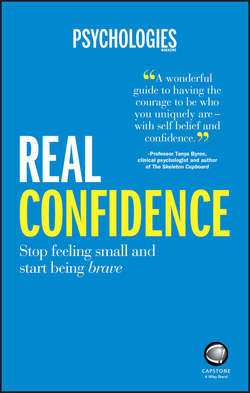Читать книгу Real Confidence - Magazine Psychologies - Страница 5
На сайте Литреса книга снята с продажи.
1
HOW CONFIDENT ARE YOU?
CHAPTER 1
DEFINING CONFIDENCE – IS IT WHAT YOU THINK IT IS?
ОглавлениеWe suspect you believe lack of confidence is the reason certain aspects of your life are not working out the way they do for everyone else who has confidence. You don’t blame anyone else for not earning more money, or not finding a job post-redundancy, or not finding love after divorce, or not buying a home, or not having children, or not changing careers, or not losing weight, or not getting fit, or not making new friends. This feeling, that it’s your fault, that it’s all because you’ve got no confidence, is very common. You’re not alone. Lacking confidence doesn’t feel good. You feel like there’s some screw missing from the intricate parts of your brain, or there’s a malfunction in your brain’s software, right? If you could just fix that, if there was a confidence app for your brain you’d be fine, right?
Confidence has become the holy grail of modern life. It’s not just the big concepts like success and happiness that we’ve come to believe depend on confidence, somehow we think that it’s the foundation to our inner structure, that it’s what would enable us to create our ideal outer lives.
But do we even know what it really is? Unless you really know what confidence is, how can you develop it? What is it?
Analysing the meaning of confidence prompts fascinating discussions. Let’s start with the Oxford English Dictionary definition. Here we see that one aspect of the meaning is a feeling of being able to trust or rely on someone or something. That’s a reminder that we need to learn to trust and rely on ourselves. (If you already trust and rely on yourself, even just a little, then you can smile and feel good about yourself.)
As for the definition with regard to individuals, the following comes up in the Oxford Advanced Learner’s Dictionary:
A feeling of self-assurance arising from an appreciation of one’s own abilities or qualities.
A belief in your own ability to do something and be successful.
The feeling that you are certain about something.
Specifying ‘self-confidence’ gives us the following dictionary definition:
A feeling of trust in one’s abilities, qualities and judgement.
If we also look at the Oxford English Dictionary definition of self-esteem, it seems to be one step further than confidence in our own worth or abilities:
A feeling of being happy with your own character and abilities.
So is confidence based on self-esteem? Is self-esteem inner and confidence outer, or does outer confidence show inner self-esteem? Does high self-esteem lead to self-confidence? What a mental maze.
